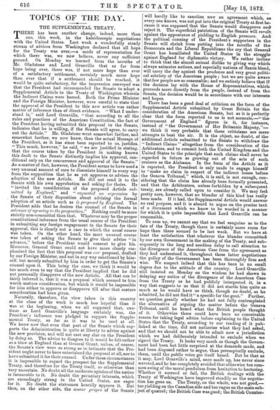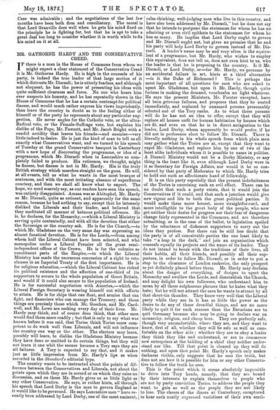TOPICS OF THE DAY.
THE SUPPLEMENTAL TREATY.
THERE has been another change, indeed, more than one, this week, in the kaleidoscopic negotiations with the United States. Last week a wonderfully steady stream of advices from Washington declared that all hope for the Treaty was over,—a mode of representation for which there was, we now believe, never any sufficient ground. On Monday we learned from the mouths of Mr. Gladstone and Lord Granville that so far from hope being over, there was, if not more hope than ever of a satisfactory settlement, certainly much more hope than ever that if a settlement should be reached, it would be quite satisfactory, for the impression conveyed was that the President had recommended the Senate to adopt a Supplemental Article to the Treaty of Washington wherein the Indirect Claims were barred. Both the Prime Minister and the Foreign Minister, however, were careful to state that the approval of the President to this new article was rather matter of inference than of direct evidence. " What I under- stand is," said Lord Granville, " that according to all the rules and practices of the American Constitution, the fact of the President having submitted this proposal to the Senate, indicates that he is willing, if the Senate will agree, to carry out the Article." Mr. Gladstone went somewhat farther, and somewhat farther, we now know, than the actual Message of the President, as it has since been reported to us, justifies. " This much, however," he said, " we are justified in stating, that the course taken by the President in making known this draft to the Senate distinctly implies his approval, con- ditional only on the concurrence and approval of the Senate." As a matter of fact, however, the President seems to have used a very unusual amount of care to dissociate himself in every way from the supposition that he as yet approves or advises the adoption of the new Article. He did not send it to the Senate with his own approbation and asking for theirs. He " invited the consideration of the proposed Article sub- mitted by England," and " requested an expression by the Senate of their disposition about advising the formal adoption of an article such as is proposed by England. The President adds that he desires the counsel of the Senate in advance of agreeing to the proposition." Nothing could be more strictly non-committal than that. Whatever may be the proper constitutional inference from the usual course of the President in submitting any foreign engagement to the Senate for their approval, this is clearly not a case in which the usual course was taken. On the other hand, the most unusual course was taken of asking the Senate to give their advice " in advance," before the President would consent to give his. Moreover, General Grant could not have more clearly em- phasised the fact that this proposal was our proposal, drafted by our Foreign Minister, and not in any way sanctioned by him- self, but merely submitted by him in order to get the Senate's counsel upon it. This being the case, we think it would be too much even to say that the President implied that he did not personally disapprove of the new Article. All that can be fairly inferred is, that it was a proposal which seemed to him worth mature consideration, but which it would be impossible for him either to approve or disapprove till after that mature consideration had been given.
Naturally, therefore, the view taken in this country at the close of the week is much less hopeful than it was at the beginning, when we all supposed that, cau- tious as Lord Granville's language certainly was, the President's influence was pledged to support the Supple- mental Treaty, so far as it was to be used at all. We know now that even that part of the Senate which sup- ports the Administration is quite at liberty to advise against the new provision, and will not cast any slur on the President by doing so. The advice to disagree to it would be felt rather as a blow at England than at General Grant, unless, of course, the Senate's view were so strong as to intimate that the Pre- sident ought never to have entertained the proposal at all, nor to have submitted it for their counsel. Under these circumstances it is impossible to regard the prospect for the Supplemental Treaty, and therefore for the Treaty itself, as otherwise than very uncertain. No doubt all the moderate opinion of the nation is favourable to it. No doubt the pecuniary interests, which are exceedingly strong in the United States, are eager for it. No doubt the statesmen heartily approve it. But then, on the other side, the amour propre of the Senate
will hardly like to sanction now an agreement which, as every one knows, was not put into the original Treaty at first be- cause it was supposed that the Senate would disapprove and reject it. The superficial patriotism of the Senate will revolt against the appearance of yielding to English pressure. And the political cunning of the President's supporters in the Senate will shrink from putting into the mouths of the Democrats and the Liberal Republicans the cry that General Grant has humiliated the United States in the struggle against England for diplomatic victory. We rather incline to think that the almost animal dislike to giving way which always animates nations, and especially nations of Saxon blood,. will carry the day against the prudence and very great politi- cal sobriety of the American people ; but we are quite aware that few people are so reasonable; and we entirely believe that if the decision lay with the House of Representatives, which proceeds more directly from the people, instead of from the Senate, the decision would be in accordance with our interests and hopes.
There has been a good deal of criticism on the form of the Supplemental Article submitted by Great Britain for the consideration of the American Senate, but as it is perfectly clear that the form reported to us is not accurate,—" the Government of England " figures in it, for instance, instead of "the Government of Her Britannic Majesty,"— we think it very probable that these criticisms are mere attempts to beat the air. It is the object, no doubt, of the additional Article submitted to the Senate to withdraw the " Indirect Claims " altogether from the consideration of the Arbitrators, and to commit both the United Kingdom and the United States to the principle that such claims shall never be regarded in future as growing out of the acts of such cruisers as the Alabama. In the form of the Article as it is reported, the President is only made to engage himself to "make no claim in respect of the indirect losses before the Geneva Tribunal," which, it is said, is not enough, con- sidering that the claim has already been formally presented, and that the Arbitrators, unless forbidden by a subsequent treaty, are already called upon to consider it. We may feel pretty sure, however, that no blunder of this kind has really, been made. If it had, the Supplemental Article would answer no real purpose, and it is absurd to argue on the precise text of a document which we know to be worded in a manner for which it is quite impossible that Lord Granville can be responsible.
To sum up, we cannot say that we feel sanguine as to the fate of the Treaty, though there is certainly more room for hope than there seemed to be last week. But we have at least the satisfaction that whatever the blunder committed by our own Government in the making of the Treaty, and sub- sequently in the long and needless delay to call attention to. the divergence of the American Case from the agreement as they had understood it, throughout these latter negotiations the policy of the Government has been thoroughly firm and wise. We suspect indeed that this has been in no small degree due to the attitude of the country. Lord Granville still insisted on Monday on the wisdom he had shown in delaying any notice of the divergence of the American Case from the Treaty as he had publicly interpreted it, in a way that suggests to us that it did not startle him quite as much as he would have us think, though no doubt, as he admitted, he did not find it " a specific for the gout." Further, we question greatly whether he had not fully contemplated the alternative of arguing the matter before the Geneva Tribunal, until. he heard what the British people thought of it. Otherwise there could have been no conceivable reason for taking legal advice before explaining to the United States that the Treaty, according to our reading of it pub- lished at the time, did not authorise what they had asked, and that we should not be able to admit now a jurisdiction which we had deliberately intended to exclude when we signed the Treaty. It looks very much as though the Govern- ment had been but little surprised at the demands made, and had been disposed rather to argue, than peremptorily exclude, them, until the public voice got itself heard. But be that as it may, Lord Granville's mind, once made up, has never since wavered, and he has completely avoided that otherwise too com- mon swing of the moral pendulum from hesitation to hectoring. Whether it succeed or fail, the British dealings with the Treaty of Washington have improved steadily as the negotia- tion has gone on. The Treaty, on the whole, was not good,— too yielding on the Canadian side and too vague on the main sub- ject of quarrel; the British Case was good ; the British Counter- Case was admirable ; and the negotiations of the last few months have been both firm and conciliatory. The moral is that Lord Granville does well when he gets his mind fixed on the principle he is fighting for, but that he is apt to take a great deal too long to consider whether it is worth while to fix his mind on it at all.



































 Previous page
Previous page